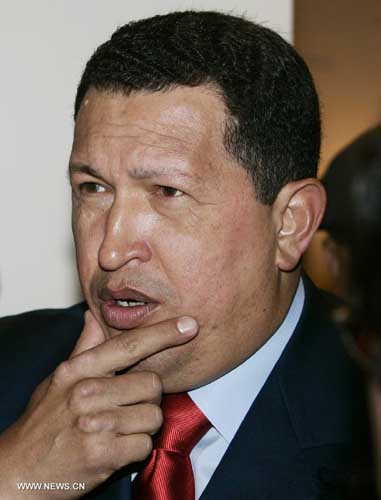What's next for Venezuela after Chavez's death
Venezuelan President Hugo Chavez died of cancer Tuesday in a military hospital in Caracas, bringing uncertainty to the South American country.
|
|
|
File photo taken on Nov. 4, 2005 shows Venezuelan President Hugo Chavez listening to questions at the 4th Summit of the Americas in Mar del Plata, Argentina. Venezuelan government confirmed President Hugo Chavez's death on March 5, 2013. [File Photo] |
The following are three questions and answers about Venezuela after Chavez's death.
1. What's the role of Venezuelan president in the country's political system?
Venezuela is a federal presidential republic governed by a constitution. The Venezuela president is both the head of state and head of government, and exercises the executive power.
The president is elected for a six-year term of office by a plurality vote with direct and universal suffrage and can be re-elected perpetually (only in consecutive terms) as of 15 February 2009. The president appoints the vice president.
2. Who will be the next president of Venezuela?
According to Venezuelan Constitution, the vote for a new president should be held within 30 days.
According to analysts, the sooner the vote is carried out, the greater is Vice President Nicolas Maduro's possibility of winning. But if the election is postponed, uncertainties around the election will increase sharply.
Before going to Cuba to receive health treatment, Chavez appointed Maduro as his political heir if he became disabled to govern.
Chavez used to praise Maduro as "a complete revolutionary, a great experienced man with great dedication and capacity for work," adding if any sudden circumstances occur, Maduro should take his place as Venezuela's leader to continue his "socialist movement."
Analysts said the high prestige of Chavez will boost Maduro's chances of winning if an election can be held soon.
3. Will Venezuela fall into great turbulence?
No. First of all, Chavez has appointed Maduro as his political successor, which shows the president had made preparations for his death. Besides, Chavez's heath treatment had lasted for a long time, which has prepared the Venezuelan people mentally.
Secondly, judging from the current situation, the opposition does not intend to seize the political power through violence.
Thirdly, over the years, Chavez had replaced senior generals in the army after a military coup against him in 2002. Now the army has a comparatively high loyalty to him.
Fourthly, the relationship between the United States and Venezuela has improved since U.S. President Barack Obama came to power despite frequent conflicts between the two countries.
The United States also does not want Venezuela, one of its main oil suppliers, to fall into great turbulence. It also can accept Maduro as the future Venezuelan leader.








